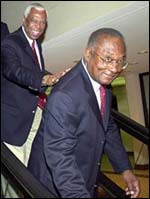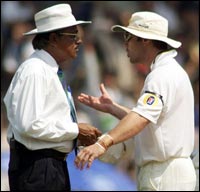

How's that, umpire?
Daniel Laidlaw
Much was made of Michael Slater's outburst in the first Test and match
referee Cammie Smith's limp-wristed reaction to it. Then Slater prolonged
the focus on the incident by publicly claiming the media over-reacted. The
main cause of the outcry, which indeed has gone on too long, seems not to be
Slater heatedly but constructively (according to him) defending himself to
umpire Venkataraghavan and batsman Rahul Dravid, but the fact he was not
punished for it.
As we all know, lesser offences have been viewed more harshly by match referees sterner than Cammie Smith. Herein lies the problem.
There would not be anywhere near as much complaint over the sentences, or
lack thereof, handed down by match referees if there was some degree of consistency in their verdicts. But as we have seen time and again, there isn't. What Cammie Smith deems worthy of a warning, John Reid might decide earns a suspension, or Hanumant Singh, deserves a fine. There is no apparent
consistency or unity across the panel of match referees in punishments meted out, which surely frustrates fans and players more than the sentences themselves. How are we supposed to know when a player has crossed the line
of acceptable behaviour when the ICC code of conduct is open to the
interpretation of individual match referees with their own personal values?
 In a true gentleman's game, the position of match referee would not be
required. But since the sport needs a roving judge to oversee the playing of
each series and conduct of players involved, the position requires a
professional.
In a true gentleman's game, the position of match referee would not be
required. But since the sport needs a roving judge to oversee the playing of
each series and conduct of players involved, the position requires a
professional.
The current match referee system, which sees retired cricketers tamely, if
at all, applying the laws as set out by the ICC, is part of cricket's
painful transition from the antiquated image of being a gentleman's game to
a modern, professional sport. One problem is that the officials, belonging
to a gentler era, are not at the same level of professionalism as the
players. This has to change if the laws are to be effectively and
consistently enforced.
Why are match referees ex-Test players? They don't have to be. Other than
having a detailed understanding of the game and its laws, nothing in their
portfolio requires referees to have played international cricket. It is
actually detrimental to the job they are supposed to perform. Good fellows
like Cammie Smith, who last played 40 years ago, come from era of
gentlemanly on-field conduct and goodwill (or so we are told) and
undoubtedly still carry those virtues into their decisions. In short, they
treat today's players as people with the same honesty and integrity they
possessed, which makes them ill-prepared for the job at hand.
To improve the on-field conduct of players, it would be better if match
referees were disciplinarians without a background in cricket as it was
played 30 years ago. They could be judges, lawyers or any other kind of
professional who has no emotional association with the game and is prepared
to deal with player behaviour as it is described in the code of conduct.
As it stands, this is far from being the case. The average age of an ICC match
referee is 60. The most recently retired referee, Ranjan Madugalle, last
played 13 years ago. These are unquestionably good people with a wealth of
international cricket behind them. But they are not the characters needed to
firmly oversee the correct conduct of today's game.
Currently, allegations of bias by match referees abound, which is unfair. As
with umpires, one hopes the individual standards of each referee is applied
to all teams, rather than just a few. India, in particular, seems to feel
discriminated against by match referees. That may well be so. But equally,
it could just be that they have played series in front of tough match
referees while misbehaving opponents have been fortunate enough to encounter
the soft ones. This is what happens when interpretations are inconsistent.
To end the inconsistency and confusion over match referees' rulings, the
system needs a total overhaul. The ICC has begun to show signs of
progression so it should not prove overly difficult. They could appoint a
handful of full-time professional referees, slashed from the current 20, who
are given an edict to improve the game in all areas under the purview of the
match referee that have been allowed to lapse. In conjunction with umpires,
matters like overt sledging, excessive appealing and dissent can be
diminished, if not eliminated.
I was pleased to notice recently that Indian match referee Hanumant Singh
announced before the current England-Sri Lanka series that he would be
taking a tough stance on any improper conduct. Having given this notice,
Singh proceeded to fine four Sri Lankan players for excessive appealing and
issued a suspended sentence to Graeme Hick for dissent. He should be
applauded for this. If a tough-minded referee like Singh was overseeing the
India-Australia series, I seriously doubt Michael Slater would have been let
off with merely a warning.
 But by allowing referees to set differing
standards, complaints are bound to arise. If India, for example, plays its
next series under a harsh referee and Dravid blows up over a catch like
Slater did and is subsequently fined or suspended, there would surely be
cries of bias against the Indian team. What this would actually show is the
unacceptable inconsistency among the panel of match referees.
But by allowing referees to set differing
standards, complaints are bound to arise. If India, for example, plays its
next series under a harsh referee and Dravid blows up over a catch like
Slater did and is subsequently fined or suspended, there would surely be
cries of bias against the Indian team. What this would actually show is the
unacceptable inconsistency among the panel of match referees.
It is impossible to have any faith in the justice of the system when each
referee has his own interpretation of acceptable conduct. Therefore,
uniformity in decision-making and application of the code of conduct is
essential, which is something the ICC could stress to its new referee panel.
If the rules are breached then the match referee must take firm action
against the player concerned, and not with inconsequential sentences such as
fines of 25 per cent of a player's match fee or the ICC-trademark "suspended
suspension." If it is made clear to all teams that serious action will be
taken against breaches of the code, then a match referee could suspend
Slater over an incident like the one seen in the first Test without fear of
a backlash. Under the existing system, if that had happened, Slater and the
Australians would have felt discriminated against because they could have
pointed to numerous past occasions when other indiscretions went unpunished.
But it has to start somewhere.
The cricket world needs to be put on notice. The ICC, by overhauling its
panel of match referees could, in doing so, announce that conduct breaches
will henceforth be viewed seriously and punishments will be severe. With an
elite panel of match referees all briefed together on exactly what is
required of them, there should be minimal inconsistencies and hopefully no
claims of bias. We can then more readily accept a match referee's verdict in
the knowledge that it is a uniform decision applied in keeping with the
interpretations of the rest of the panel.
Mail Daniel Laidlaw